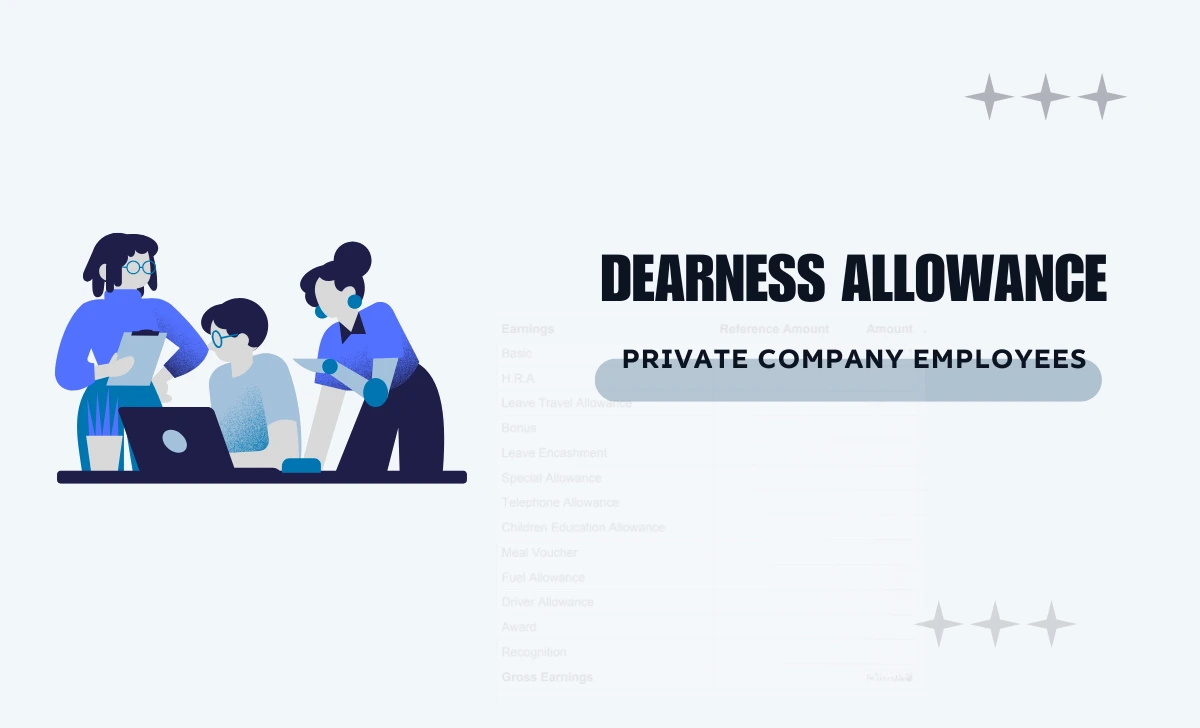Dearness Allowance (DA) is a crucial component of salary structures in India, designed to offset the impact of inflation on employees’ purchasing power. While Dearness Allowance is predominantly associated with government employees and some private company are increasingly exploring its relevance.
This article delves into the concept of DA in private companies, its calculation, legal status, and implications for employees.
What is Dearness Allowance in Private Companies?
Dearness Allowance in private companies refers to a cost-of-living adjustment provided by employers to help employees cope with inflation.

Unlike in the government sector, DA is not mandatory for private companies. However, some organizations voluntarily include it as part of their compensation packages to maintain employee satisfaction and competitiveness.
Key Features:
- Purpose: To counteract inflation and ensure employees maintain their standard of living.
- Voluntary Nature: Private companies are not legally obligated to provide DA.
- Calculation Basis: Often linked to the Consumer Price Index (CPI), which measures inflation.
How is Dearness Allowance Calculated in Private Companies?
The calculation of DA typically follows a formula similar to that used in the public sector:
DA = (Basic Salary×DA Rate) * 100
For example, if an employee’s basic salary is ₹40,000 and the DA rate is 20%, the DA would be:
DA =40,000×20 / 100=₹8,000
Private companies that offer DA often adjust it semi-annually or annually based on inflation trends reflected in the CPI.
Role of Consumer Price Index (CPI):
The CPI is a critical factor in determining DA rates, It tracks changes in the prices of goods and services over time.
Higher CPI values indicate increased inflation, prompting employers to revise DA rates upward.
Is Dearness Allowance Mandatory in Private Companies?
No, dearness allowance is not mandatory for private-sector employees under Indian labor laws. Its provision depends entirely on an employer’s discretion and company policies. This contrasts with government sectors where DA is a statutory benefit.
Difference Between DA in Government and Private Sectors
| Aspect | Government Sector | Private Sector |
|---|---|---|
| Mandatory Provision | Yes | No |
| Calculation Basis | Linked to CPI and Pay Commission recommendations | CPI or company-specific criteria |
| Frequency of Revision | Semi-annual (January & July) | Varies; often annual or discretionary |
| Tax Implications | Fully taxable | Fully taxable |
DA Policies for Private Sector Employees in India
While not standardized across industries, some private companies offer allowances similar to DA under different names. These policies aim to attract and retain talent by mitigating the effects of inflation. However, such benefits are generally more common in larger organizations or sectors with strong labor unions.
Tax Implications of Dearness Allowance in Private Companies
Dearness Allowance is fully taxable under Indian income tax laws. It forms part of an employee’s gross salary and can increase their tax liability by pushing them into a higher tax bracket. Employees must report DA separately when filing income tax returns.
Tax Considerations:
- If DA exceeds 50% of basic salary, it may impact exemptions like House Rent Allowance (HRA).
- For retirement benefits, a portion of DA may be included in calculations for pension or gratuity.
